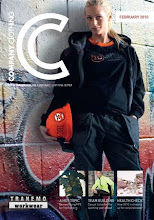Thursday, 26 November 2009
Label victims
Sceptical? Well, ten pairs of ladies' jeans and ten polo shirts underwent rigorous testing in fifteen different trials aimed at judging the garments’ colour-fastness, seam strength, shrinkage after washing and resistance to abrasion.
In general, the cheaper items fared better than their more expensive rivals, with the £8 pair of jeans coming out on top and the £123 pair lagging behind in fourth place. Full marks also went to a £12 polo shirt, while the £85 shirt came in fifth place.
Andy Garbutt, retail expert at PWC, said: 'We didn't test for fit, fashionability or brand. We purely looked at the quality of the clothes, how well made they were. And it is clear that there is no longer a link between quality and price. It may not have been the cheapest clothes that won, but it was often the second cheapest.'
While a £115 saving might seem appealing in the run-up to a credit crunch Christmas, unfortunately PWC has refused to reveal the names of the retailers tested for fear of 'damaging relationships' with clients.
Thursday, 29 October 2009
Your pants offend me
John Walker of Kiniki doesn't understand what the fuss is about though: “We’re not trying to be cheeky or step on anyone’s toes here. We simply thought it was a great event to be a part of. I can see how people who don’t like wearing clothes could get shirty about us being their sponsor. You could say it’s the equivalent of a butcher sponsoring a vegetarian event." An interesting analogy.
Established in 1976, Kiniki has grown from a backroom business for mail order men’s underwear to a company with more than 30 million sales under its belt (if the naturists were offered belts a riot could break out).
Friday, 23 October 2009
Suit up!
So, it seems understandable to read that Job Centres are handing out almost £10m a year to job seekers for vouchers to enable them to buy suits at high street stores to help them get jobs.
Certainly we've written many times about the work that goes in to making top quality suits and, while high street suits may not be bespoke, or suitable (no pun) for working in the Bank of England, for those looking to get back in to work, a smart suit is a great way to put a spring in the step as those at the interview stage sit down behind a desk to those familiar words of "So, tell me why you think..."
Monday, 19 October 2009
There goes the sun
Although dark clothing is usually shunned in hot weather for light, floaty, bright colours, Dr Ascension Riva, who led the study - published in the journal Industrial and Engineering Chemistry said, “The colour of cotton woven fabrics is a factor that has a remarkable influence on their protection against ultraviolet radiation." She added, "Clothing manufacturers could use information from this study to better design sun-protective clothing."
So, what are you waiting for, get to it - in time for next years heatwave!
Tuesday, 13 October 2009
iPhone Glove
 Technology and clothing go together like a horse and carriage (to mangle a well-known phrase) and the latest advancement in this area concerns everybody's favourite iPhone (other mobile devices are available) and gloves. Yes that's right - gloves for your iPhone.
Technology and clothing go together like a horse and carriage (to mangle a well-known phrase) and the latest advancement in this area concerns everybody's favourite iPhone (other mobile devices are available) and gloves. Yes that's right - gloves for your iPhone.Apparently, these help you use the touch screen more accurately or use the phone in cold climates, like Scotland. One manufacturer, US-based Dot Gloves, said its version was aimed specifically at countries where winters can be notoriously chilly.
The problem for device users is that normal gloves are too cumbersome or slide over the glossy screen, designed to be activated by bare fingers. The new gloves cost £10-£30 a pair, depending on the design. Some, like Dot Gloves, incorporate three electro-static rubber "dots" in the fingertips to connect users with their screens even in the harshest of climates. Microfibre palm grips make sure they do not slip from freezing hands.
A spokesman for Dot Gloves said: "If you own an iPhone and are in Scotland you'll know what it's like using the iPhone on those cold winter days. The screen doesn't work with gloves on and trying to use that iPhone touch screen with cold fingers is not an easy thing to do, but the gloves are a way around this."
Quite - wouldn't make a bad Christmas gift for some people actually...oh no, we mentioned Christmas - forgive us please...
Thursday, 8 October 2009
Fighting off Swine Flu while looking suave
 As we head into the winter months the risk of Swine Flu returns once more. The colder conditions, people staying indoors more, all leads to the possibility of catching the dreaded disease. Fighting back could involve washing hands regularly, avoiding people who have had the illness and so on - but also you could wear this suit, which claims to keep the disease at bay.
As we head into the winter months the risk of Swine Flu returns once more. The colder conditions, people staying indoors more, all leads to the possibility of catching the dreaded disease. Fighting back could involve washing hands regularly, avoiding people who have had the illness and so on - but also you could wear this suit, which claims to keep the disease at bay.On The Telegraph the story says, "The suit is coated with the chemical titanium dioxide, which reacts to light to break down and kill the virus when it comes into contact with it, according to Junko Hirohata. The chemical is a common ingredient in toothpaste and cosmetics."
The suit retails at £365 but with 4,100 deaths already confirmed due to swine flue around the world, it wouldn't be surprising if it found a fair few customers.
Monday, 5 October 2009
CARdigan
A car made from clothes. There's a novel idea. Well, in fact, it's been made. And in some style too, as you can see from this picture. The story on The Telegraph website gives some details of car's components: "The car is made from 1,999 items - including 1,682 t-shirts, 88 pairs of jeans, 64 pairs of shoes and 31 belts". Fan belts presumably?
A team of eight people worked for five hours at the Puma store in Carnaby Street, London, to turn the pile of clothes into a model of Kimi Raikkonen's motor. Black jeans are used for the tyres and red t-shirts give the car its classic Ferrari colour. Many fans have been visiting the store to see the car while a time-lapse video showing the team making the car has been watched more than 130,000 times on the internet.
Creative director Peter Hale, from GBH Design, said: "The Formula1 car was great fun to make and looks great.We worked like a pit crew when making it - each person piecing a different part of the car together."
Friday, 2 October 2009
Pants
 What's a good way to get people to think about their health? Adverts? Leaflets? Pretty standard stuff like that at least right?
What's a good way to get people to think about their health? Adverts? Leaflets? Pretty standard stuff like that at least right?Not in China. Oh no. For them, to make men aware of the dangers of wearing pants that are too tight they hung a 12ft pair of pants from the front of a hospital in Changsha Bo Da Hospital in Changsha, southern China. Certainly an interesting marketing strategy. Although, it's clearly worked as even we are blogging about it, passing on their message. Perhaps not so pants after all!
Monday, 28 September 2009
Suits you sir
For, the old guard, who have been there for many years, are not happy with 'interlopers' who they accuse of selling suits under the 'Savile Row' brand, without offering the same level of service or quality. On the back of this they are going as far as setting up an Association which will bestow a 'kitemark' upon those who are regarded as genuine Savile Row tailors, to let discerning suit shoppers tell who will offer them, the genuine experience.
This is the trouble though isn't it - a world where costs are high, margins are tight, and pennies need to be watched will undoubtedly lead to people wanting high-quality products for the cheapest possible price, and if there are companies willing to offer this, there will always be customers to buy. Still, if the new association does its job, at least everyone can be clear who is offering what and after that it's down to the consumer as to where there heads, hearts and wallets lead them.
Thursday, 24 September 2009
Uniforms on stamps
They also feature an 1805 Royal Marine, an Able Seaman from 1880, a 1918 Women's Royal Navy Service Officer and a Second World War Captain.
Julietta Edgar, head of special stamps at Royal Mail, said: 'Some of our most significant commemorative issues have highlighted the bravery and sacrifice of the UK's servicemen and women, and they continue to play a key role in the stamps that we issue.'
Vice Admiral Sir Alan Massey added: ''These stamps reflect the great history of the senior service and uniquely represent changes in the Royal Navy, from the development of the fleet air arm to the introduction of women at sea. The importance of mail to the morale of our personnel deployed around the world cannot be overstated, and Royal Mail continues to provide us with a terrific service.'



